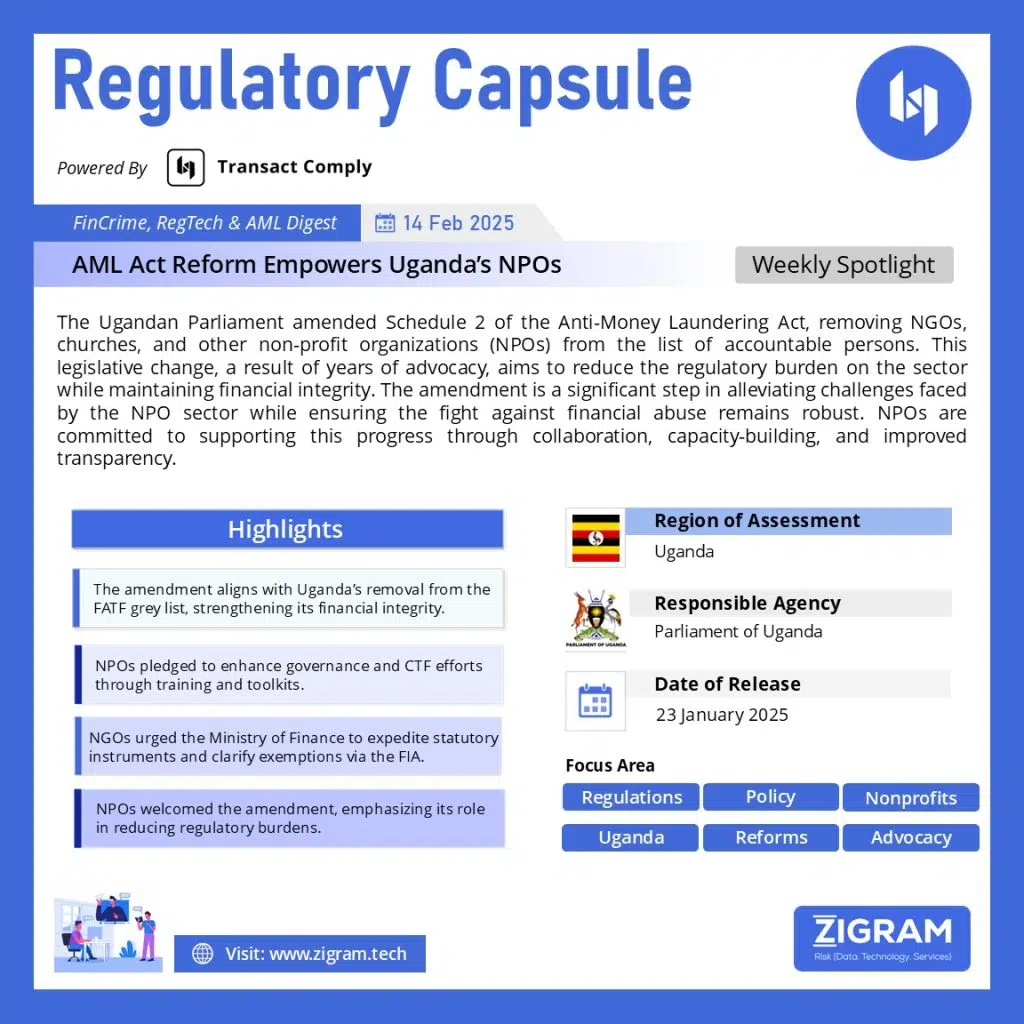Regulation Name: Schedule 2 of the Anti-Money Laundering Act
Date of Release: 23 January 2025
Region: Uganda
Agency: Parliament of Uganda
Uganda’s Civil Society Celebrates Milestone Amendment to Anti-Money Laundering (AML) Act
In a landmark decision on January 23, 2025, the Ugandan Parliament amended Schedule 2 of the Anti-Money Laundering Act, removing NGOs, churches, and other non-profit organizations (NPOs) from the list of accountable persons. This significant development has been widely praised by the country’s civil society sector as a step toward fostering a more supportive regulatory environment for non-profits.
The National NPO Working Group on Financial Action Task Force (FATF), comprising organizations such as Chapter Four, Anti-Corruption Coalition Uganda, Defenders Protection Initiative, and others, welcomed the move. In a joint statement, the group emphasized that the decision reduces undue regulatory burdens while recognizing the vital role NPOs play in Uganda’s socio-economic development.
A Step Toward Progress
The amendments have been lauded for relieving NPOs of excessive compliance obligations, such as filing reports and submitting returns, which had previously hindered the sector’s growth. The change is seen as a victory for civil society after years of advocacy led by organizations like the Defenders Protection Initiative.
“This amendment paves the way for a more conducive regulatory framework that enables NPOs to continue their invaluable work without unnecessary scrutiny,” the group noted during a press briefing in Kampala.
Calls for Swift Implementation
Despite the progress, NGOs have urged the Ministry of Finance to expedite the issuance of a statutory instrument to operationalize the amendments. Additionally, they called on the Financial Intelligence Authority (FIA) to formally notify NGOs of their exemption from compliance obligations and work collaboratively to ensure clarity on the new regulations.
Strengthening Capacity and Governance
In a show of commitment, NPOs pledged to enhance their internal controls and build capacity to mitigate risks related to terrorism financing. Initiatives include tailored outreach programs, capacity-building workshops, and the development of toolkits to improve governance, transparency, and accountability.
Alignment with FATF Standards
This amendment comes on the heels of Uganda’s removal from the FATF grey list in February 2024, which signaled the country’s progress in addressing deficiencies in its anti-money laundering and counter-terrorism financing frameworks. The decision aligns with Uganda’s commitment to maintaining financial integrity while supporting the growth of civil society organizations.
Conclusion
The recent amendment to the Anti-Money Laundering Act represents a pivotal moment for Uganda’s NPO sector. By reducing regulatory burdens and fostering a supportive environment, the country is empowering its civil society to focus on their essential work for the betterment of communities. As Uganda continues to build a robust financial system, the collaboration between NPOs, the Financial Intelligence Authority, and other stakeholders will remain critical in ensuring sustainable progress.
Read the full law here.
Read about the product: Transact Comply
Empower your organization with ZIGRAM’s integrated RegTech solutions – Book a DemoChina’s AML Law Revision
- #AntiMoneyLaundering
- #CivilSocietyUganda
- #NPOsUganda
- #RegulatoryReforms
- #NGOAdvocacy
- #GovernanceMatters
- #TransparencyInAction
- #CapacityBuilding
- #FinancialIntegrity
- #FATFCompliance
